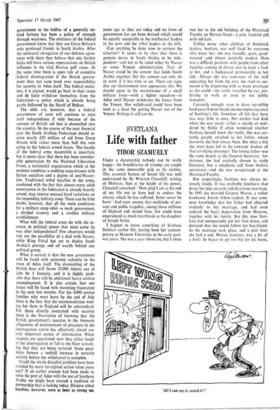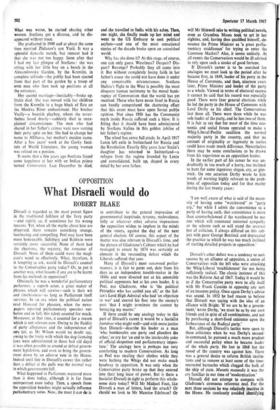Life with father
SVETLANA TIBOR SZAMUELY
Under a dictatorship nobody can be really happy: the beneficiaries of tyranny are caught in the same inexorable grip as its victims. This essential feature of Soviet life was well understood by Sir Winston Churchill; writing of Molotov, then at the height of his power, Churchill remarked: `How glad I am at the end of my life not to have had to endure the stresses which he has suffered; better never be born.' And even among that multitude of pri- vate and public tragedies, among those millions of blighted and ruined lives, few could have experienced as much heartbreak as the daughter of Joseph Stalin.
I happen to know something of Svetlana Stalina's earlier life, having been her contem- porary at Moscow University in the early post- war years. She was a year above me, but I often
'All I can say is, It arch it ! '
met her in the old building of the Historical Faculty on Herzen Street: a pale, freckled girl with red hair.
Unlike many other children of Bolshevik leaders, Svetlana was well liked by everyone who knew her; she was friendly, quiet, good- natured—and almost painfully modest. Hers was a difficult position. with people from other faculties coming in droves just to have a look at her, and a bodyguard permanently at her side. Always she was conscious of the wall separating her from the rest; she tried to sur- mount it by dispensing with as many privileges as she could-she rarely travelled by car, pre- ferring to walk or even to use public transport.
Curiously enough, even in those incredibly hard years I never heard anyone expressing envy of Svetlana's life. Somehow all felt that there was very little to envy. Her mother had died when she was seven—either a suicide or mur- dered by Stalin (I often wondered whether Svetlana herself knew the truth). She was cer- tainly greatly attached to her father, whose favourite she had always been. But what a life she must have led in the constant shadow of that terrifying presence! The loving father was the same despot as the General Secretary: for instance, she had orginally chosen to study literature, but a telephone call from Stalin's secretariat—and she was re-registered at the Historical Faculty.
Not surprisingly, Svetlana was always in- tensely lonely. It was probably loneliness that drove her into an early and disastrous marriage. In 1945 she married Grigory Moroz, a rather handsome Jewish fellow-student. It was com- mon knowledge that her father had objected violently to her marriage, and had even ordered the boy's deportation from Moscow, together with his family. But this time Svet- lana had unexpectedly put her foot down, and declared that she would follow her boy-friend. So the marriage took place, and a year later she had a son. Moroz, however, was a bit of a fool: he began to get too big for his boots. What was worse, he started chasing other women. Svetlana got a divorce, and he dis- appeared without trace.
She graduated in 1949 and at about the same time married Zhdanov's son Yurii. It was a splendid dynastic match, but rumour had it that she was not too happy. Soon after that I had my last glimpse of Svetlana: she was sitting with her little boy on a bench in the Alexandrovsky Garden, by the Kremlin, in complete solitude—the public had been ejected from that part of the garden by a troop of ?AVE) men who then took up positions at all the entrances.
Her second marriage—inevitably—broke up. Stalin died. She was moved with her children from the Kremlin to a huge block of flats on the Moskva River embankment. Her brother Vasily—a boorish playboy, whom she never- theless loved dearly—suddenly died in unex- plained circumstances. The men who had shared in her father's crimes were now venting their petty spite on her. She had to change her name to Allilueva, her mother's maiden name. After a few years' work at the Gorky Insti- tute of World Literature, the young woman was retired on a pension.
It seems that a few years ago Svetlana found some happiness at last with an Indian prince turned Communist. Last December he died, and she travelled to India with his ashes. Then, one night, she finally made up her mind and went to the US Embassy to seek political asylum—and one of the most sensational stories of the decade broke upon an astonished world.
Why has she done it? At this stage, of course, one can only guess. Weariness? Despair? Dis- gust? Revenge? Probably they all come into it. But without completely losing faith in her father's cause she could not have done it under any conceivable circumstances. Svetlana Stalina's flight to the West is possibly the most eloquent human testimony to the moral bank- ruptcy of Communism that the world has yet received. Those who have never lived in Russia can hardly comprehend the shattering effect that this event must have upon Soviet public opinion. Not since 1956 has the Communist myth inside Russia suffered such a blow. It is fitting that it should have been administered by Svetlana Stalina in this golden jubilee of her father's regime.
The wheel has come full circle. In April 1917 Lenin left exile in Switzerland for Russia and the Revolution. Exactly fifty years later Stalin's daughter has returned to Switzerland—a refugee from the regime founded by Lenin and consolidated, built up, shaped in every detail by her own father.































 Previous page
Previous page